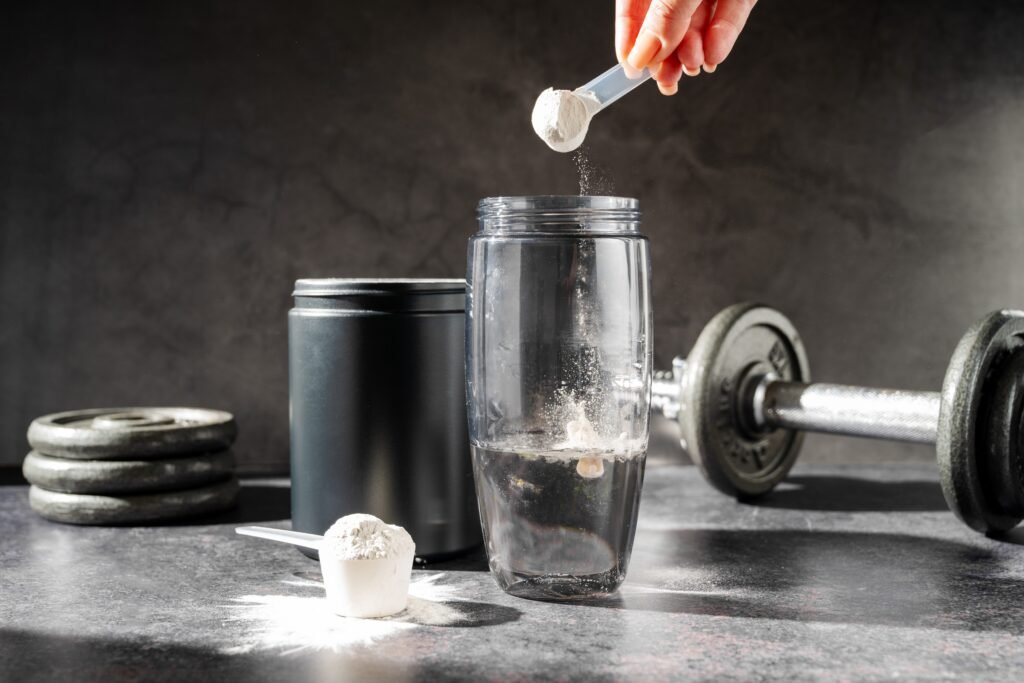Creatine is one of the most popular and widely researched options in the fitness world. Known for its role in boosting muscle growth, strength, and athletic performance, it has earned a spot in the supplement stacks of athletes, bodybuilders, and fitness enthusiasts alike. But is it the right supplement for you?
This guide will help you determine whether it’s worth adding to your routine by exploring its benefits, who should (and shouldn’t) use it, potential side effects, and more. Whether you’re a seasoned athlete or just beginning your fitness journey, this article will give you the tools to make an informed decision.
What is Creatine and How Does It Work?
This naturally occurring compound is stored primarily in muscles. It plays a critical role in producing ATP (adenosine triphosphate), which is the primary energy source during high-intensity exercise like sprinting or weightlifting.
While your body naturally produces some, supplementation allows you to increase muscle stores, boosting energy output and helping you perform better during physical activities. Foods like red meat and fish also contain small amounts of it, but many athletes choose to supplement to achieve higher levels.
Who Should Take Creatine?
t is widely used because of its benefits, particularly in athletic and high-intensity activities. But not everyone needs to use this compound. Let’s explore who can benefit most from adding it to their regimen.
1. Athletes, Bodybuilders, and Strength Trainers
This supplement is highly effective for athletes engaged in high-intensity, short-duration activities like sprinting, powerlifting, and bodybuilding. It improves muscle strength, power output, and exercise capacity, allowing you to push harder and recover faster between sets.
2. Recreational Gym-Goers
Even if you’re not a professional athlete, this product can be beneficial if you’re regularly working out at the gym. It enhances muscle endurance and recovery, which helps with consistent progress.
3. Older Adults
The compound is also beneficial for older adults. As we age, we naturally lose muscle mass and strength, leading to sarcopenia (age-related muscle loss). Studies have shown that supplementation can help older adults maintain muscle mass, improve strength, and support better functionality in everyday tasks.
4. Vegetarians and Vegans
Since this compound is found naturally in animal products like meat and fish, vegetarians and vegans typically have lower natural stores. For these individuals, supplementation can help fill the gap and boost energy production, performance, and cognitive function.

Who Shouldn't Take It?
While safe for most people, there are certain individuals who should avoid it or consult a healthcare provider before using it.
1. Individuals with Kidney Issues
People with pre-existing kidney conditions should consult their doctor before starting any supplement. Though research has shown that it doesn’t harm kidney function in healthy individuals, it’s best to get medical advice if you have kidney concerns.
2. Those Not Engaged in High-Intensity Training
If your workout routine doesn’t involve high-intensity training, weightlifting, or anaerobic exercises, you might not need this supplement. For example, endurance athletes like marathon runners or those focused on low-intensity cardio may not experience significant benefits.
3. Pregnant or Breastfeeding Women
There is limited research on the effects during pregnancy and breastfeeding, so it’s best for these individuals to avoid it unless recommended by a healthcare provider.
Creatine Benefits
While Creatine is known for its muscle-building and strength-enhancing effects, its benefits go beyond the gym. Let’s break down the various benefits of Creatine, both for athletic performance and overall health.
Enhanced Muscle Growth and Strength
Creatine is most famous for increasing muscle mass. It helps muscles retain water, making them look fuller, but it also promotes muscle hypertrophy by enhancing the body’s ability to perform more work during resistance exercises. Creatine supplementation can lead to faster gains in muscle size and strength.
A study published in the Journal of Strength and Conditioning Research found that those who took Creatine during a 12-week resistance training program gained significantly more muscle mass and strength than those who did not. On average, users gained 2-4 pounds of lean muscle mass over a short period.
Improved Strength and Power Output
Creatine increases phosphocreatine stores in your muscles, which allows for better ATP regeneration. This extra ATP helps you exert more force during high-intensity activities like weightlifting, sprinting, or jumping. Studies show that athletes who take Creatine can increase their strength and power output by 5-15%.
Faster Recovery Between Sets
Creatine enhances recovery between sets of high-intensity exercise by allowing for faster ATP regeneration. This means you can recover more quickly between bouts of exertion, allowing for more intense and longer workouts.
Better Muscle Endurance
By boosting ATP levels, Creatine can also improve muscle endurance during exercises that require sustained effort, like multiple sets of weightlifting or high-intensity interval training (HIIT). Athletes using Creatine are often able to perform more reps before reaching fatigue.
Brain Health and Cognitive Function
One of the lesser-known benefits of Creatine is its positive effect on brain health. Just like muscles, the brain relies on ATP for energy, and Creatine supplementation can improve cognitive function, especially in high-stress situations. Studies have shown that Creatine can:
- Improve short-term memory and reasoning skills, particularly in sleep-deprived individuals.
- Enhance mental fatigue resistance, which helps you stay mentally sharp during demanding tasks.
A study conducted by researchers at Swinburne University found that Creatine supplementation improved cognitive performance in tasks requiring quick thinking and decision-making.
Neuroprotective Benefits
Emerging research suggests it may also have neuroprotective properties. It has shown promise in helping to protect against neurological disorders like Parkinson’s disease, Alzheimer’s disease, and Huntington’s disease. Though more research is needed, initial studies indicate that supplementation may slow the progression of these conditions by improving mitochondrial function and protecting brain cells.
Improved Bone Health
This supplement may also play a role in improving bone health by increasing muscle mass and strength, which in turn supports stronger bones. This benefit is particularly important for older adults who are at risk of osteoporosis. Increased muscle mass helps support the skeletal system, reducing the likelihood of falls and fractures.
Cardiovascular Health
Though primarily marketed for its muscle and performance benefits, some research suggests it may have a positive impact on heart health. By improving muscle endurance and overall exercise capacity, this supplement could indirectly contribute to better cardiovascular health.
A study in Cardiovascular Research also suggests it could enhance the function of skeletal muscle in heart failure patients, improving their quality of life and exercise tolerance.

Potential Side Effects of Creatine
Like any supplement, Creatine comes with some potential side effects. However, the majority of users tolerate it well.
Water Retention and Weight Gain
Creatine pulls water into the muscle cells, which can result in temporary water retention and weight gain. This is a harmless side effect, but some users may notice a slight bloated feeling during the initial phase. If you’re concerned about how Creatine affects weight, check out our detailed guide: Does Creatine Make You Gain Weight?
Stomach Discomfort
Some users experience stomach cramps or digestive discomfort, especially if taking higher doses during the loading phase. To minimize this, try splitting up doses throughout the day or using a more easily digestible form like Creatine HCL.
Kidney Health Concerns
There has been concern in the past about kidney damage, but studies have shown that this supplement is safe for healthy individuals. If you have pre-existing kidney conditions, consult a doctor before starting supplementation.
How to Take Creatine Properly
To get the most out of Creatine, it’s essential to use it correctly. Here’s what you need to know about dosing, timing, and cycling.
The Loading Phase
The loading phase involves taking about 20 grams of Creatine per day (split into four 5-gram doses) for 5-7 days. This phase helps saturate your muscle Creatine stores more quickly.
Pros:
- Faster results in terms of muscle strength and performance.
Cons:
- Possible water retention and bloating during the first week.
The Maintenance Phase
Once your muscles are saturated with Creatine, you can move to the maintenance phase, where you take 3-5 grams daily to maintain your muscle stores. This phase can be sustained indefinitely.
When to Take Creatine
There is some debate over whether to take Creatine before or after workouts, but research generally shows that post-workout supplementation is slightly more beneficial for muscle recovery and growth. However, taking it consistently every day (at any time) will still provide benefits.
Should You Cycle Creatine?
While there is no need to cycle Creatine (e.g., take breaks every few months), some users prefer to do so to avoid any potential long-term side effects, although the research doesn’t show any major risks with continuous use.
How to Determine if Creatine is Right for You
Here are a few factors to consider when deciding whether to add it to your regimen:
- Fitness Goals: If your goal is to build muscle, improve strength, or boost performance in high-intensity workouts, this supplement can be a valuable addition to your routine.
- Exercise Routine: It’s most effective for activities that involve short bursts of intense energy, such as weightlifting, sprinting, or HIIT. If you’re more focused on long-duration, low-intensity activities, the benefits might be less noticeable.
- Diet: If you follow a diet that’s naturally low in this compound (e.g., vegetarian or vegan), supplementation may help increase your body’s stores.
Frequently Asked Questions
1. How Much Should I Take Daily?
For the maintenance phase, take 3-5 grams per day. If you choose to do a loading phase, take 20 grams per day for 5-7 days, then switch to the maintenance dose.
2. Can Women Take it?
Yes, this supplement is safe and effective for women. It can help improve strength, muscle mass, and performance, just like in men.
3. Is it Safe for Long-Term Use?
Yes, studies show that it is safe for long-term use in healthy individuals. There’s no need to stop taking it unless you prefer to cycle.
4. Does it Cause Hair Loss?
There is no conclusive evidence linking this supplement to hair loss. Some reports are based on speculation, but most studies have found no connection between it and male pattern baldness.
5. What Are the Best Creatine Products?
To find the best products available on the market, check out our detailed guide on the Top 10 Best Creatine Supplements on the Market. This list includes well-researched and top-rated options to help you choose the right product for your fitness goals.
Should You Take Creatine?
Creatine is a highly effective supplement that has been proven to enhance muscle growth, strength, and athletic performance. Its benefits extend beyond the gym, with positive effects on brain function, bone health, and possibly even heart health. Whether you’re focused on building muscle, improving performance in high-intensity workouts, or speeding up recovery, it can be a valuable addition to your routine.
However, it’s important to assess your personal goals, training style, and health status before deciding if this supplement is right for you. If you’re still looking for more information on how it works, its full range of benefits, potential side effects, and how to use it effectively, check out our Ultimate Guide to Creatine for a comprehensive overview.
With the right approach, Creatine can help you reach new levels of fitness and performance, whether you’re lifting weights or aiming to improve your overall health.









